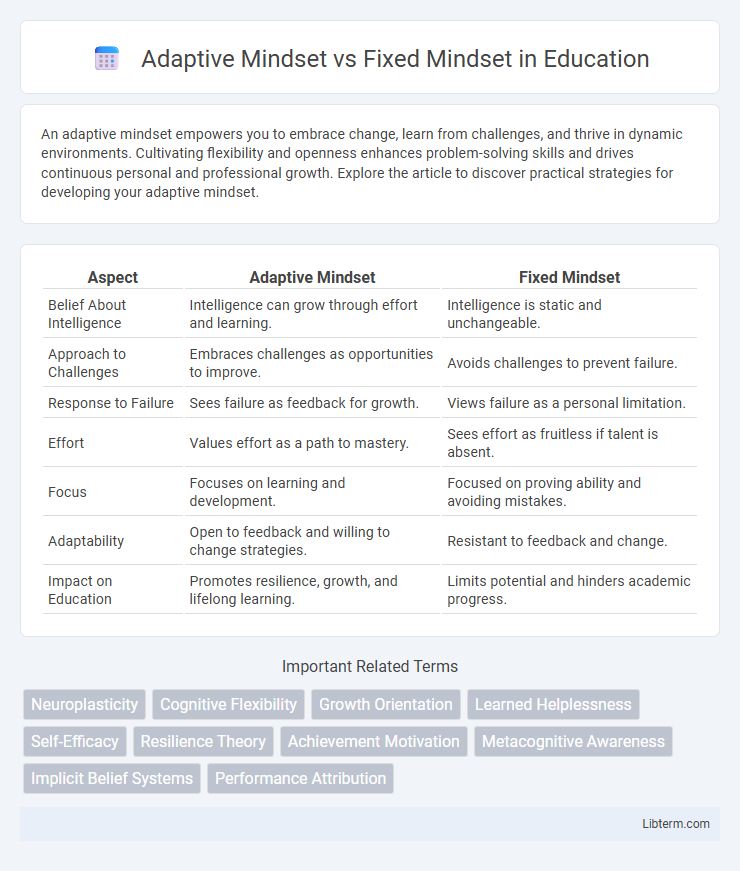An adaptive mindset empowers you to embrace change, learn from challenges, and thrive in dynamic environments. Cultivating flexibility and openness enhances problem-solving skills and drives continuous personal and professional growth. Explore the article to discover practical strategies for developing your adaptive mindset.
Table of Comparison
| Aspect | Adaptive Mindset | Fixed Mindset |
|---|---|---|
| Belief About Intelligence | Intelligence can grow through effort and learning. | Intelligence is static and unchangeable. |
| Approach to Challenges | Embraces challenges as opportunities to improve. | Avoids challenges to prevent failure. |
| Response to Failure | Sees failure as feedback for growth. | Views failure as a personal limitation. |
| Effort | Values effort as a path to mastery. | Sees effort as fruitless if talent is absent. |
| Focus | Focuses on learning and development. | Focused on proving ability and avoiding mistakes. |
| Adaptability | Open to feedback and willing to change strategies. | Resistant to feedback and change. |
| Impact on Education | Promotes resilience, growth, and lifelong learning. | Limits potential and hinders academic progress. |
Understanding Mindsets: Adaptive vs Fixed
Understanding mindsets involves distinguishing between adaptive and fixed perspectives on learning and intelligence. An adaptive mindset embraces challenges, views failure as a learning opportunity, and believes abilities can be developed through effort and strategy. In contrast, a fixed mindset assumes intelligence and talents are static traits, often leading to avoidance of difficulties and reduced motivation to improve.
Core Characteristics of an Adaptive Mindset
An adaptive mindset is characterized by openness to new experiences, resilience in the face of challenges, and a commitment to continuous learning and growth. Individuals with an adaptive mindset embrace change, view failures as opportunities for improvement, and actively seek feedback to enhance their skills. Unlike a fixed mindset, they believe abilities can be developed through effort, persistence, and strategic problem-solving.
Defining Features of a Fixed Mindset
A fixed mindset is characterized by the belief that intelligence and abilities are static traits that cannot be changed or improved. Individuals with a fixed mindset often avoid challenges, fear failure, and view effort as fruitless because they think abilities are inherent rather than developed. This mindset leads to a reluctance to embrace learning opportunities and a tendency to give up easily when faced with obstacles.
Psychological Origins of Each Mindset
The psychological origins of a fixed mindset are often rooted in early experiences where intelligence and abilities are perceived as innate and unchangeable, leading to a focus on performance outcomes rather than growth. In contrast, an adaptive mindset develops through environments that emphasize learning, effort, and resilience, fostering neural plasticity and motivation to embrace challenges. Research highlights the role of parental feedback, educational settings, and social influences in shaping whether individuals adopt a fixed or adaptive approach to their capabilities.
How Mindset Influences Learning and Growth
An adaptive mindset fosters resilience and a willingness to embrace challenges, leading to continuous learning and personal growth. In contrast, a fixed mindset limits potential by causing individuals to avoid effort and fear failure, restricting skill development and innovation. Neuroscientific studies reveal that brain plasticity is enhanced through adaptive thinking, reinforcing the critical role mindset plays in cognitive flexibility and long-term achievement.
The Impact on Problem-Solving and Innovation
An adaptive mindset promotes growth by embracing challenges and learning from failures, significantly enhancing problem-solving skills and fostering innovation. Individuals with this mindset are more likely to experiment with new ideas and approaches, leading to creative solutions and continuous improvement. In contrast, a fixed mindset limits problem-solving capacity by avoiding risks and fearing failure, inhibiting innovation and reducing resilience in dynamic environments.
Overcoming Barriers: Transitioning to an Adaptive Mindset
Overcoming barriers to transition from a fixed mindset to an adaptive mindset involves recognizing and challenging limiting beliefs that hinder growth and resilience. Embracing continuous learning, self-reflection, and constructive feedback enables individuals to reframe failures as opportunities for development. Cultivating neuroplasticity through deliberate practice supports mental flexibility, essential for adapting to new challenges and achieving long-term success.
Real-World Examples: Adaptive vs Fixed Mindset in Action
Leaders with an adaptive mindset embrace challenges like Netflix's pivot from DVD rentals to streaming, fostering innovation and resilience in turbulent markets. In contrast, companies with a fixed mindset, such as Blockbuster's refusal to adapt to digital trends, often face decline and obsolescence. Employees with an adaptive mindset pursue continuous learning and skill development, while those with a fixed mindset avoid risks and limit potential growth.
Strategies for Cultivating an Adaptive Mindset
Cultivating an adaptive mindset involves embracing challenges as opportunities for growth and actively seeking feedback to improve skills and knowledge. Practicing self-reflection and reframing failures as learning experiences fosters resilience and flexibility in problem-solving. Setting incremental goals and maintaining curiosity enhances continuous development and openness to change.
Long-Term Benefits of Embracing Adaptability
Embracing an adaptive mindset enhances cognitive flexibility, enabling individuals to navigate challenges and seize growth opportunities more effectively than a fixed mindset. This long-term adaptability fosters resilience, continuous learning, and improved problem-solving skills, which are critical for sustained personal and professional development. Organizations that cultivate adaptive mindsets benefit from increased innovation, agility, and the ability to thrive in rapidly changing environments.
Adaptive Mindset Infographic

 libterm.com
libterm.com